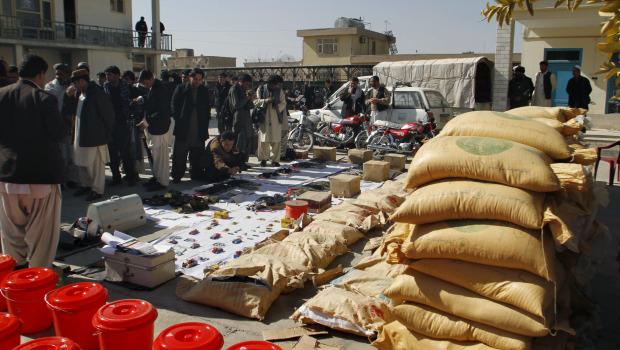Al Qaeda, the Taliban and other terrorist organizations are receiving hundreds of millions of dollars from illegal drugs in Afghanistan, warned a report by the top U.S. watchdog in Afghanistan.
Despite unseccessful counternarcotic efforts, Afghanistan is expected to produce 90 percent of the world’s opium supply this year, a key ingredient in the creation of heroin, said the Special Inspector General for Afghanistan Reconstruction (SIGAR).
The Congressional Research Service – which conducts nonpartisan research for lawmakers — estimates that insurgents in Afghanistan are receiving between $70-$100 million each year from the drug trade. But a June report by Afghanistan’s Minister of Counternarcotics said that number could higher — as much as $400 million.
“In insurgent-controlled territory, insurgents collect this income by taxing poppy farmers, running protection rackets, operating heroin labs and conducting kidnappings and other smuggling schemes,” the IG said. “Insurgents also win political support by protecting farmers from eradication or interdiction efforts.”
As of July 2013, the U.S. has poured $4.42 billion into counternarcotics efforts, mostly from programs in the State and Defense Departments. The programs have included efforts to eradicate drug farms. For the first six months of 2013, the U.S. and its Afghan allies destroyed 7,692 hectares of poppy fields — less than the 11,032 hectares destroyed during the same period in 2012. (One hectare is about 2.5 acres).
But the amount of opium grown is so great, the UN estimates that less than 10 percent of poppy fields are destroyed each year.
A growing Afghan economy, coupled with the anti-drug efforts, has led to less of the nation’s fiscal health relying on the drug trade. This year, the export value of opium is expected to be 13 percent of Afghanistan’s GDP, down from an average of 25 percent between 2007 and 2012.
But millions of dollars are still finding their way into the hands of insurgents, and Afghan police efforts have been able to seize less than 2 percent of the annual production.
Corrupt officials have also been a chief difficulty in fighting drugs, SIGAR investigators said.
“The Afghan public loses faith in its government when political elites use eradication to destroy rivals’ poppy crops and pay bribes to escape eradication themselves,” the inspector general said.
The situation is likely only going to become more difficult to deal with as U.S. troops complete their withdrawal from Afghanistan next year. (Washington Times)
Despite unseccessful counternarcotic efforts, Afghanistan is expected to produce 90 percent of the world’s opium supply this year, a key ingredient in the creation of heroin, said the Special Inspector General for Afghanistan Reconstruction (SIGAR).
The Congressional Research Service – which conducts nonpartisan research for lawmakers — estimates that insurgents in Afghanistan are receiving between $70-$100 million each year from the drug trade. But a June report by Afghanistan’s Minister of Counternarcotics said that number could higher — as much as $400 million.
“In insurgent-controlled territory, insurgents collect this income by taxing poppy farmers, running protection rackets, operating heroin labs and conducting kidnappings and other smuggling schemes,” the IG said. “Insurgents also win political support by protecting farmers from eradication or interdiction efforts.”
As of July 2013, the U.S. has poured $4.42 billion into counternarcotics efforts, mostly from programs in the State and Defense Departments. The programs have included efforts to eradicate drug farms. For the first six months of 2013, the U.S. and its Afghan allies destroyed 7,692 hectares of poppy fields — less than the 11,032 hectares destroyed during the same period in 2012. (One hectare is about 2.5 acres).
But the amount of opium grown is so great, the UN estimates that less than 10 percent of poppy fields are destroyed each year.
A growing Afghan economy, coupled with the anti-drug efforts, has led to less of the nation’s fiscal health relying on the drug trade. This year, the export value of opium is expected to be 13 percent of Afghanistan’s GDP, down from an average of 25 percent between 2007 and 2012.
But millions of dollars are still finding their way into the hands of insurgents, and Afghan police efforts have been able to seize less than 2 percent of the annual production.
Corrupt officials have also been a chief difficulty in fighting drugs, SIGAR investigators said.
“The Afghan public loses faith in its government when political elites use eradication to destroy rivals’ poppy crops and pay bribes to escape eradication themselves,” the inspector general said.
The situation is likely only going to become more difficult to deal with as U.S. troops complete their withdrawal from Afghanistan next year. (Washington Times)
Source : Afghan Voice Agency (AVA), International Service







